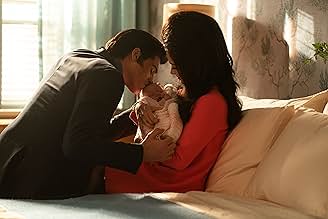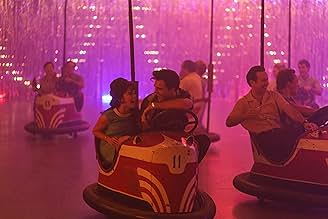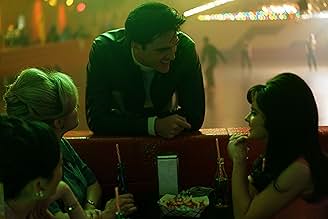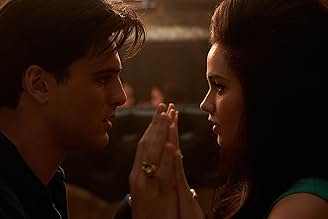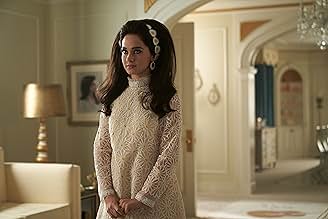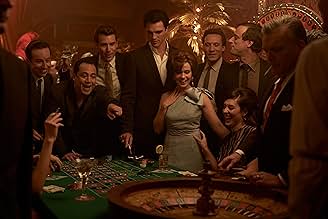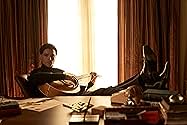When teenage Priscilla Beaulieu meets Elvis Presley, the man who is already a meteoric rock-and-roll superstar becomes someone entirely unexpected in private moments: a thrilling crush, an a... Read allWhen teenage Priscilla Beaulieu meets Elvis Presley, the man who is already a meteoric rock-and-roll superstar becomes someone entirely unexpected in private moments: a thrilling crush, an ally in loneliness, a vulnerable best friend.When teenage Priscilla Beaulieu meets Elvis Presley, the man who is already a meteoric rock-and-roll superstar becomes someone entirely unexpected in private moments: a thrilling crush, an ally in loneliness, a vulnerable best friend.
- Director
- Writers
- Stars
- Awards
- 6 wins & 33 nominations total
Dan Beirne
- Joe
- (as Daniel Beirne)
- Director
- Writers
- All cast & crew
- Production, box office & more at IMDbPro
Featured reviews
It is 1949, and American teenager Priscilla Beaulieu is in Germany with her parents. At a party one night, she meets Elvis Presley, who is stationed in the same military base as her father. The King is drawn to her, while she is smitten by his down-to-earth charm and seemingly genuine humanity. As time goes on, the two forge a relationship, and by 1963, she is living with him in Memphis. However, being The King's wife proves more difficult than she imagined, and far more lonesome.
Written and directed by Sofia Coppola, and based on 'Elvis and Me' by Priscilla Presley and Sandra Harmon, 'Priscilla' is a visually evocative drama both striking and flawed. Firstly, the title is something of a misnomer, as this is not the story of Priscilla Presley's life, rather an overview of the years she spent with Elvis (one wonders why the source material's title was not retained). The narrative focuses on her growing isolation, trapped in Graceland, at the beck and call of her controlling husband. However, due to Coppola's cold approach to the themes of agency and control, her examination of same leaves one oddly unmoved.
Moreover, despite the fact that she is ostensibly the central character, we aren't offered insight into Priscilla's motivations, or aspirations, nor does she have much of a personality. She is a soft-spoken, kind-hearted girl at the beginning and- for all intents and purposes- the very same at the end. Coppola's dialogue lacks wit, while Sarah Flack's ponderous editing leaves proceedings feeling lethargic- all the more so due to the dearth of characterisation and dialogue therein.
Some critics are quick to state that the film is purposefully superficial, that Coppola is interested only in the surface level. By focusing on the skin, as it were, and not the heart beneath, she re-enforces the idea that everything in Elvis's life was an easily purchasable object, even Priscilla. However, as the title would suggest, this is not meant to be a movie about Elvis. Therefore, the scant character development or depth with regard to Priscilla is alienating. We don't have much reason to root for her, except as a result of the obvious distaste engendered by Elvis's mood swings and controlling behaviour.
As a result, the audience feels detached from proceedings, disconnected from the characters both emotionally and psychologically. Although Coppola creates a more human version of The King than viewers saw in Baz Luhrman's 'Elvis' or Liza Johnson's 'Elvis & Nixon', by demythologizing and bringing him down to earth, much of his charisma is diluted. The film's version of the man is a brooding, volatile control freak, without much magnetism or charm. Furthermore, secondary characters are barely more than shadows in darkness; you can hardly make them out at all.
Conversely, Coppola - and frequent collaborator Philippe Le Sourd's - cinematography is stunning. Their composition makes Priscilla appear small and out of place compared to Elvis, like a China doll discarded in a playground. Their use of juxtaposing colours adds to the luxury of Graceland, as well as to Priscilla's isolation, while the soft lighting throughout lends the film an air of romance and intimacy. Everything in the film drips with textural richness, immersing the viewer in a lavish, decadent world, where every surface glistens with silk, velvet and gold.
In addition, Stacey Battat's costume design contributes to the personalities of the characters astutely (perhaps more so than Coppola's screenwriting), heightening the visual contrast between Elvis and Priscilla. Her costume, makeup and hairstyle changes, in particular, mirror her evolution from a shy girl to an independent woman- even if Coppola's screenplay doesn't detail that journey; Priscilla's varying appearance does. Additionally, Tamara Deverell's intricate production design- as well as the set decoration from Patricia Cuccia- lends the film authenticity and realism.
Moreover, the soundtrack is stirring, utilising both modern and period pieces. Although Elvis's estate refused permission for any of his songs to be used, Coppola makes excellent use of tracks by the likes of Dolly Parton and The Ronettes, bolstering the narrative's themes. Contemporary music is interwoven cleverly into proceedings, never feeling as jarring and out of place as it does in the aforementioned Luhrman's efforts, complementing things nicely.
Cailee Spaeny stars as Priscilla, opposite Jacob Elordi as Elvis. Spaeny displays Priscilla's innocence subtly, being nuanced and understated. Although there really isn't much for her to work with, she overcomes the limited characterisation of the role, while handling dull dialogue with ease. Similarly, Elordi makes Coppola's angsty, moody version of Elvis an interesting, multifaceted character. He might not really look like The King, but he shares a good chemistry with Spaeny. Unfortunately, a parade of supporting actors- notably Dagmara Dominczyk and Ari Cohen as Priscilla's parents- are largely wasted, given little to do.
In conclusion, Sofia Coppola's 'Priscilla' is trying to say some interesting things about fame, agency and control, but never gets around to saying them. Coppola's narrative is too cold and calculated, while her characterisation and dialogue are too minimalist to make much impact. Conversely, the cinematography and production design are striking, while the stirring score complements proceedings cleverly. Cailee Spaeny does fine work as the titular character, as does her co-star Jacob Elordi as Elvis. Although it has its moments, it's a moody blue film that suspicious minds might want to return to sender.
Written and directed by Sofia Coppola, and based on 'Elvis and Me' by Priscilla Presley and Sandra Harmon, 'Priscilla' is a visually evocative drama both striking and flawed. Firstly, the title is something of a misnomer, as this is not the story of Priscilla Presley's life, rather an overview of the years she spent with Elvis (one wonders why the source material's title was not retained). The narrative focuses on her growing isolation, trapped in Graceland, at the beck and call of her controlling husband. However, due to Coppola's cold approach to the themes of agency and control, her examination of same leaves one oddly unmoved.
Moreover, despite the fact that she is ostensibly the central character, we aren't offered insight into Priscilla's motivations, or aspirations, nor does she have much of a personality. She is a soft-spoken, kind-hearted girl at the beginning and- for all intents and purposes- the very same at the end. Coppola's dialogue lacks wit, while Sarah Flack's ponderous editing leaves proceedings feeling lethargic- all the more so due to the dearth of characterisation and dialogue therein.
Some critics are quick to state that the film is purposefully superficial, that Coppola is interested only in the surface level. By focusing on the skin, as it were, and not the heart beneath, she re-enforces the idea that everything in Elvis's life was an easily purchasable object, even Priscilla. However, as the title would suggest, this is not meant to be a movie about Elvis. Therefore, the scant character development or depth with regard to Priscilla is alienating. We don't have much reason to root for her, except as a result of the obvious distaste engendered by Elvis's mood swings and controlling behaviour.
As a result, the audience feels detached from proceedings, disconnected from the characters both emotionally and psychologically. Although Coppola creates a more human version of The King than viewers saw in Baz Luhrman's 'Elvis' or Liza Johnson's 'Elvis & Nixon', by demythologizing and bringing him down to earth, much of his charisma is diluted. The film's version of the man is a brooding, volatile control freak, without much magnetism or charm. Furthermore, secondary characters are barely more than shadows in darkness; you can hardly make them out at all.
Conversely, Coppola - and frequent collaborator Philippe Le Sourd's - cinematography is stunning. Their composition makes Priscilla appear small and out of place compared to Elvis, like a China doll discarded in a playground. Their use of juxtaposing colours adds to the luxury of Graceland, as well as to Priscilla's isolation, while the soft lighting throughout lends the film an air of romance and intimacy. Everything in the film drips with textural richness, immersing the viewer in a lavish, decadent world, where every surface glistens with silk, velvet and gold.
In addition, Stacey Battat's costume design contributes to the personalities of the characters astutely (perhaps more so than Coppola's screenwriting), heightening the visual contrast between Elvis and Priscilla. Her costume, makeup and hairstyle changes, in particular, mirror her evolution from a shy girl to an independent woman- even if Coppola's screenplay doesn't detail that journey; Priscilla's varying appearance does. Additionally, Tamara Deverell's intricate production design- as well as the set decoration from Patricia Cuccia- lends the film authenticity and realism.
Moreover, the soundtrack is stirring, utilising both modern and period pieces. Although Elvis's estate refused permission for any of his songs to be used, Coppola makes excellent use of tracks by the likes of Dolly Parton and The Ronettes, bolstering the narrative's themes. Contemporary music is interwoven cleverly into proceedings, never feeling as jarring and out of place as it does in the aforementioned Luhrman's efforts, complementing things nicely.
Cailee Spaeny stars as Priscilla, opposite Jacob Elordi as Elvis. Spaeny displays Priscilla's innocence subtly, being nuanced and understated. Although there really isn't much for her to work with, she overcomes the limited characterisation of the role, while handling dull dialogue with ease. Similarly, Elordi makes Coppola's angsty, moody version of Elvis an interesting, multifaceted character. He might not really look like The King, but he shares a good chemistry with Spaeny. Unfortunately, a parade of supporting actors- notably Dagmara Dominczyk and Ari Cohen as Priscilla's parents- are largely wasted, given little to do.
In conclusion, Sofia Coppola's 'Priscilla' is trying to say some interesting things about fame, agency and control, but never gets around to saying them. Coppola's narrative is too cold and calculated, while her characterisation and dialogue are too minimalist to make much impact. Conversely, the cinematography and production design are striking, while the stirring score complements proceedings cleverly. Cailee Spaeny does fine work as the titular character, as does her co-star Jacob Elordi as Elvis. Although it has its moments, it's a moody blue film that suspicious minds might want to return to sender.
I saw this 2 weeks ago and completely forgot that I had. Even watching the trailer right now doesn't bring memories of me watching this movie. It's like a bland meal with zero spices. Totally unoriginal. Utterly boring and predictable. It's sad because this is a story worth telling and I'm sure that it was an epic ride for Priscilla but this movie barely made any impact. It lacked something major and I can't even put my finger on it. Don't get me wrong, it wasn't terrible but it was nothing to rave about.
My main issue with this movie is how Priscilla is portrayed. She is totally character-less. Almost no emotion. Very slow. Lifeless. As if she never even lived. Even the party scenes in Vegas were slow and lifeless. It may have been the editing or maybe the low budget (?) but this movie did not portray the grand-ness and epic-ness of the life that Elvis' girl must have had.
Watch if you're bored and have nothing better to do. Otherwise, skip.
My main issue with this movie is how Priscilla is portrayed. She is totally character-less. Almost no emotion. Very slow. Lifeless. As if she never even lived. Even the party scenes in Vegas were slow and lifeless. It may have been the editing or maybe the low budget (?) but this movie did not portray the grand-ness and epic-ness of the life that Elvis' girl must have had.
Watch if you're bored and have nothing better to do. Otherwise, skip.
Wow, this was an uncomfortable movie to watch. Priscilla invites inevitable comparisons to last year's "Elvis," portraying an exact opposite narrative. Helmed by the talented Sophia Coppola, who commands great respect, and featuring Jacob Elordi, an actor I admire, the film falls short of expectations. Unfortunately, it presents a one-dimensional, flat perspective that left me somewhat disappointed.
While the performances are strong, and the direction commendable, Priscilla's narrative feels tedious and slow at times. The harrowing depiction of power imbalances in the central relationship adds a layer of discomfort that makes the film hard to watch. Sophia Coppola's artistic choices unveil a side of the characters that, while impactful, renders the viewing experience challenging. Priscilla sheds light on the vulnerability of a young protagonist, emphasizing the discomfort of witnessing a story where she is just a child.
While the performances are strong, and the direction commendable, Priscilla's narrative feels tedious and slow at times. The harrowing depiction of power imbalances in the central relationship adds a layer of discomfort that makes the film hard to watch. Sophia Coppola's artistic choices unveil a side of the characters that, while impactful, renders the viewing experience challenging. Priscilla sheds light on the vulnerability of a young protagonist, emphasizing the discomfort of witnessing a story where she is just a child.
Early in Sofia Coppola's languid distillation of Priscilla Presley's life with Elvis, she receives a beautifully coiffed and presented gift of a pet poodle. Priscilla (Cailee Spaeny) had recently moved into Graceland when she gets the present. 14 when they met in Germany, Priscilla was still only 17. She coddles the pooch and treats it like a little princess. Coppola (who wrote the screenplay adapted from Priscilla's book) makes a case that Elvis (Jacob Elordi) viewed his then future wife as a type of possession. When the teenager asks for permission to take a part-time job, the musician forbades it saying that he needs her to be available whenever he desires. Like the dog, Priscilla is always to be primped and pampered to its owner's specifications.
One could say that PRISCILLA represents the other side of Baz Luhrman's recent phantasmagorical film ELVIS in both style and POV. That's certainly true in many ways, but it's doubtful that Coppola would have made her movie much differently even if Luhrman's film didn't exist. Phillipe La Sourd's cinematography, Tamara Deverell's Production Design and Stacey Battat's costuming all fit nicely within Coppola's aesthetic. The filmmaker's love of pop music is also fully on display with period songs mixed freely with more recent tunes in a similar vein (the movie begins with The Ramones and fades out with Dolly Parton).
Coppola has rarely been an auteur interested in pure plot and narrative drive. She prefers to soak the viewer into the milieu of her characters. On that level, PRISCILLA has a certain effectiveness. Neither Spaeny nor Elordi are stars, but, their anonymity adds to their relatability. Elordi in particular, faces not only comparisons to Austin Butler's ebullient Oscar nominated performance, but decades of imitators. He humanizes the mythic figure even if, at a certain point, his lack of flash reduces the King of Rock 'N Roll to too much the mere mortal. The elephant in the room is, of course, that Elvis would be considered persona non grata in today's climate. When Priscilla first enters Graceland, Elvis' ever-present entourage are taken aback at how young she looks. Coppola exaggerates the difference by casting actors over a foot apart in height (the real difference was closer to 8"). It does make her look like a little girl (and Spaeny convincingly pulls it off despite being only a year younger than Elordi; Elvis was a decade Priscilla's senior). In Coppola (and Priscilla's) telling, Elvis isn't portrayed as making his young wife into a purely sexual object. He kept her under glass in his misguided notion that he was protecting her. To make her into an idealized good Christian girl and modern Southern belle who his recently deceased mama could have been proud of. It's an extraordinary tricky balance - particularly with the real Priscilla being a Producer on this film.
By design, PRISCILLA never takes a truly deep look at all the details of the couple's lives. Colonel Tom Parker is only vaguely alluded to. The viewer sees Elvis performing only near the very end, and briefly. Once at Graceland, Priscilla is barely shown with anyone other than Elvis' posse. The movie only spans the years they were together. It's a very insular movie which relies heavily on mood and atmosphere. It will be up to each individual viewer if that is sufficient.
One could say that PRISCILLA represents the other side of Baz Luhrman's recent phantasmagorical film ELVIS in both style and POV. That's certainly true in many ways, but it's doubtful that Coppola would have made her movie much differently even if Luhrman's film didn't exist. Phillipe La Sourd's cinematography, Tamara Deverell's Production Design and Stacey Battat's costuming all fit nicely within Coppola's aesthetic. The filmmaker's love of pop music is also fully on display with period songs mixed freely with more recent tunes in a similar vein (the movie begins with The Ramones and fades out with Dolly Parton).
Coppola has rarely been an auteur interested in pure plot and narrative drive. She prefers to soak the viewer into the milieu of her characters. On that level, PRISCILLA has a certain effectiveness. Neither Spaeny nor Elordi are stars, but, their anonymity adds to their relatability. Elordi in particular, faces not only comparisons to Austin Butler's ebullient Oscar nominated performance, but decades of imitators. He humanizes the mythic figure even if, at a certain point, his lack of flash reduces the King of Rock 'N Roll to too much the mere mortal. The elephant in the room is, of course, that Elvis would be considered persona non grata in today's climate. When Priscilla first enters Graceland, Elvis' ever-present entourage are taken aback at how young she looks. Coppola exaggerates the difference by casting actors over a foot apart in height (the real difference was closer to 8"). It does make her look like a little girl (and Spaeny convincingly pulls it off despite being only a year younger than Elordi; Elvis was a decade Priscilla's senior). In Coppola (and Priscilla's) telling, Elvis isn't portrayed as making his young wife into a purely sexual object. He kept her under glass in his misguided notion that he was protecting her. To make her into an idealized good Christian girl and modern Southern belle who his recently deceased mama could have been proud of. It's an extraordinary tricky balance - particularly with the real Priscilla being a Producer on this film.
By design, PRISCILLA never takes a truly deep look at all the details of the couple's lives. Colonel Tom Parker is only vaguely alluded to. The viewer sees Elvis performing only near the very end, and briefly. Once at Graceland, Priscilla is barely shown with anyone other than Elvis' posse. The movie only spans the years they were together. It's a very insular movie which relies heavily on mood and atmosphere. It will be up to each individual viewer if that is sufficient.
Priscilla does really well when it comes to cinematography and direction. There are good shots in the movie and Coppola did an amazing job as director.
However, the screenplay was very disappointing to me. The story feels slow at times and gets into a repetitive cycle after a while: Elvis does something horrible to Priscilla, they fight, Priscilla hesitates to leave him, and finally forgives him for unexplainable reasons. And in the end, when she finally leaves him, we don't know what finally made her make the decision, she just leaves. Moreover, I was expecting to see more of Priscilla's life where Elvis is not a central part of the story, as the title might have suggested, but the film starts when she meets him and ends when he is no longer part of her life.
Apart from that, I think Cailee Spaeny did an incredible job and is the highlight of the movie. I have mixed feelings about Jacob Elordi, at times he felt like the perfect choice for the role, but other times it felt like I was watching his Euphoria character.
The movie is a beautifully decorated but empty box.
However, the screenplay was very disappointing to me. The story feels slow at times and gets into a repetitive cycle after a while: Elvis does something horrible to Priscilla, they fight, Priscilla hesitates to leave him, and finally forgives him for unexplainable reasons. And in the end, when she finally leaves him, we don't know what finally made her make the decision, she just leaves. Moreover, I was expecting to see more of Priscilla's life where Elvis is not a central part of the story, as the title might have suggested, but the film starts when she meets him and ends when he is no longer part of her life.
Apart from that, I think Cailee Spaeny did an incredible job and is the highlight of the movie. I have mixed feelings about Jacob Elordi, at times he felt like the perfect choice for the role, but other times it felt like I was watching his Euphoria character.
The movie is a beautifully decorated but empty box.
Did you know
- TriviaElvis Presley Enterprises declined both their approval for Sofia Coppola's film and their permission to use Elvis Presley's songs in the film. Coppola then took to creative alternatives, including contemporary music by her husband's band, Phoenix, and cover versions of songs from the film's era.
- GoofsThe title superimposed over the opening scene is "US Air Force Base West Germany 1959" over an image of a 50 star flag. This should have been a 48 or 49 star flag. Although Hawaii had been admitted to the union on August 21, 1959, the new flag was not officially raised until July 4, 1960.
- Crazy creditsA photo of the crew is shown after the end credits.
- ConnectionsFeatured in The Making of Priscilla (2023)
- SoundtracksGoing Home
Written by Alice Coltrane and Carlos Santana
Performed by Alice Coltrane
Courtesy of Verve Records under license from Universal Music Enterprises
Seen On Screen: Elvis and Priscilla Presley
Seen On Screen: Elvis and Priscilla Presley
IMDb looks back at when both Elvis and Priscilla Presley have been portrayed by actors on screen, plus a few times the King and his wife played their own parts.
- How long is Priscilla?Powered by Alexa
Details
Box office
- Budget
- $20,000,000 (estimated)
- Gross US & Canada
- $20,960,939
- Opening weekend US & Canada
- $132,139
- Oct 29, 2023
- Gross worldwide
- $33,113,832
- Runtime1 hour 53 minutes
- Color
- Sound mix
- Aspect ratio
- 1.85 : 1
Contribute to this page
Suggest an edit or add missing content








